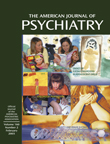To the Editor: Helen S. Mayberg, M.D., et al.
(1) observed that the patients in their study whose depression relented after treatment with either fluoxetine or placebo had nearly identical positron emission tomography (PET) brain scans. They concluded that the “facilitation of specific adaptive reciprocal limbic-cortical changes is necessary for depression remission, regardless of the mode of treatment” (p. 734).
Why “necessary”? This study shows only an association between the remission of depressive symptoms and regional changes in brain glucose metabolism, which represent changes in blood perfusion at these sites. No one knows why brain tissue perfusion is different in depressed patients, if this difference causes depression, or if it is an epiphenomenon. There is an association here without a known meaning.
Dr. Mayberg et al. spoke as if they understand the connection between a depressed mind and a “depressed” brain. Implicitly, they claimed to have closed the infamous and confounding mind-brain gap. The fact is, we do not know how brain neural structure or function affects the workings of consciousness—in this case, mood. Our efforts to make this connection are still at the level of metaphor (written text) and virtual reality (colors on a monitor indicating signal intensity from a scanner). Nonetheless, Dr. Mayberg et al. posited the primacy of brain over mind.
It seems just as reasonable to propose that, as depressed individuals pathologically reconstruct key “self-structures” after experiencing a negative life event, this transformation drives a change in brain neural function that occurs at least partly through the well-studied hypothalamic-pituitary-adrenal axis.
The question then becomes, does a psychoneural synergy connect an individual’s construction of his or her world with brain centers involved in mood modulation, and do these functional changes act as “ballast” to perpetuate depression? For severely depressed patients, perhaps changes in brain function do contribute to maintaining the depression; in mild to moderate depression, maybe not (which means the transformed “self-structure” here is the depression).
The “decade of the brain” crowned the belief that natural science offers the best approach to understanding human behavior. But how valid is the “hard” science that purports to close the mind-brain gap? In a recent issue of the
Journal, Leuchter et al.
(2), using quantitative electroencephalography (QEEG), found—contrary to the study by Dr. Mayberg et al.—that “placebo treatment induces changes in brain function that are distinct from those associated with antidepressant medication” (p. 122). As happens often in biological psychiatry, two studies purporting to measure the same phenomenon came to opposite conclusions. The authors of the QEEG article did, however, acknowledge that “these data do not prove a causal link between brain functional changes and the therapeutic effect of either medication or placebo” (p. 128).
Many of the natural science data on brain structure and function travel poorly across the mind-brain gap, as these data are used to explain the workings of consciousness.

